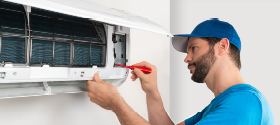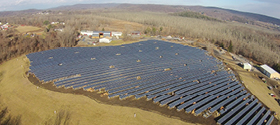Accelerating the Transition
From Natural Gas to a Low-Carbon Future: Leading a Phased and Just Transition Off Fossil Fuels
New York is working to achieve a carbon-neutral economy by 2050 as envisioned by the Climate Act ![]() .
.
To achieve New York’s climate goals, we’re working to move away from our reliance on natural gas – a fossil fuel that contributes to climate change – to heat homes and businesses, generate electricity, and power industrial processes. Methane – a greenhouse gas with significant global warming potential – is emitted during the production, processing, storage, transmission, and distribution of natural gas.
The transition from natural gas to energy sources that produce low levels of greenhouse gas emissions, such as wind and solar, may be one of the most challenging pieces of New York’s efforts to decarbonize. As we increase our renewable energy resources, New York must also reduce energy demand by scaling up energy efficiency and electrification for heating. In certain hard-to-electrify sectors, we’re pursuing research and development to prove and deploy deep decarbonization innovations to replace natural gas with alternatives with lower climate impact, such as green hydrogen and renewable natural gas.
This shift to a greener power grid and economy will bring new economic opportunities, and it’s essential that displaced fossil fuel workers receive training and support to participate in the clean energy transition.
How We’re Advancing Decarbonization for a Sustainable Future
Implementing a phased and just transition from natural gas requires creating inclusive opportunities to participate in and benefit from New York’s climate mitigation efforts and clean energy future. It also means ensuring a good quality of life for all New Yorkers by prioritizing safety, equity, reliability, and affordability as we move towards a decarbonized economy.
NYSERDA is building market and workforce capacity, expanding product availability, and driving cost reduction for electrification and clean energy alternatives to replace natural gas.
NYSERDA’s key strategies include:
- Developing and publishing long-term plans and roadmaps for advancing all-electric clean homes and buildings and green hydrogen as alternatives to fossil natural gas.
- Phasing out support for natural gas and other fossil fuels in all programs within two years and reorient investments around building shell improvements, electrification, and development of deep decarbonization alternatives.
- Providing thought leadership for gas system transition and engage in transition-related proceedings.
- Proving-out solutions for low-to-moderate income electrification – tailored to building stock and housing energy affordability needs.
- Finalizing and implementing the 2 Million Climate-Friendly Homes Action Plan to accelerate the transition of homes, including at least 40% LMI households, off inefficient and fossil-based heating systems.
- Maintaining energy affordability for all New Yorkers, prioritizing low- to moderate-income (LMI) households and strategies that can limit energy cost burden to below 6% of income.
- Focusing on reducing the cost of clean heating and cooling through innovation – demonstrate heat pump technologies and other low-carbon solutions in large commercial and multifamily buildings by working with property owners and manufacturers to deliver tailored solutions.
- Supporting cutting-edge innovations to reduce dependence on natural gas for heating, process loads, and peak demand needs, including long-duration storage.
- Building understanding of and momentum for deep decarbonization technologies, including clean hydrogen, carbon capture, and other forms of carbon-neutral tech, leveraging federal funding opportunities, such as the proposed Northeast Regional Clean Hydrogen Hub.
- Evaluating holistic impacts from deep carbonization technologies, including ongoing work to assess air pollution, land use and affordability impacts, and advancing opportunities with the greatest decarbonization potential.
- Through the Hydrogen Roadmap, studying the decarbonization potential of clean hydrogen across the key areas of energy efficiency, industrial electrification, low-carbon fuels, and carbon capture and storage and pursue federal funding to accelerate the deployment of innovative technologies within New York.
- Supporting the development of thermal energy districts that can deliver affordable, resilient heating and cooling to buildings while providing employment opportunities to support the transition of the gas workforce and establishing a regulatory framework for these systems.
Achieving a Just Transition Off Natural Gas
A carbon-neutral economy will create healthier communities and economic opportunities across the state. New York’s electric grid will be zero-emission by 2040, improving local air quality and delivering reliable clean energy through an extensive network of wind, solar, hydro power, and energy storage. Residents and businesses will continue receiving support to adopt clean energy technologies, such as heat pumps, to promote affordable electrification while phasing out the use of natural gas.
Many New York buildings will electrify their heating and cooling through community heat pump systems and thermal energy networks. These scalable systems connect multiple buildings into a shared thermal network, which can leverage multiple sources of heat, such as geothermal energy and waste heat from industrial processes or electricity generation. The development of thermal networks will create quality jobs in New York’s growing decarbonization sector, especially for those workers displaced in the transition to clean energy.
Key Programs and Initiatives
-

NYS Clean Heat
Read More NYS Clean Heat (opens in new window)Heat pumps are a smarter, more efficient option for heating and cooling buildings without the use of fossil fuels.
-

Community Heat Pumps Pilot
Read More Community Heat Pumps PilotSupports the development and demonstration of low-carbon community thermal energy networks in new construction or retrofits
-

Induction Stoves
Read More Induction StovesDiscover the energy, health, and safety benefits of switching to induction cooking.
-

Just Transition Site Reuse Planning
Read More Just Transition Site Reuse PlanningProvides communities with planning services to inform future local decision-making to help mitigate any negative impacts of pending or future fossil fuel power plant closures.
-

Multifamily Buildings Low-Carbon Pathways
Offers four packages of incentivized energy upgrades that bring deep energy savings to multifamily building systems.Read More Multifamily Buildings Low-Carbon Pathways -

Carbon Neutral Community Economic Development
Read More Carbon Neutral Community Economic DevelopmentSupports net-zero economic development projects spanning manufacturing, mixed-use, downtown revitalization, and more across New York’s ten regions.
Sign Up For News
Stay up to date on energy-saving programs and incentives, best practices, and more.
Stay Connected